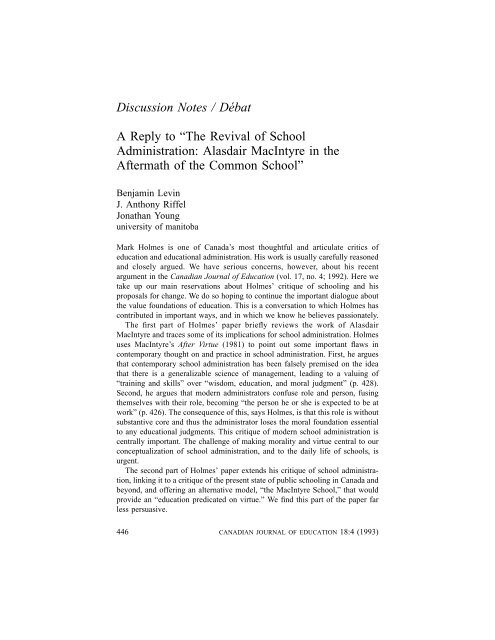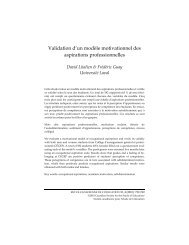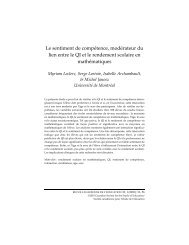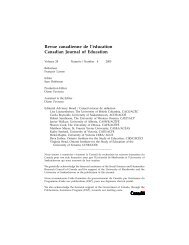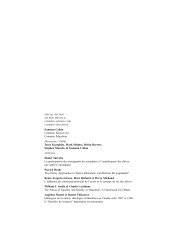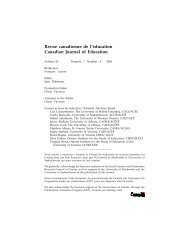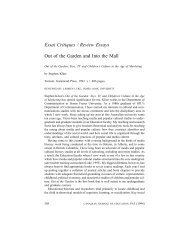Mireille Falardeau et Michel Loranger Le choix de stratégies ... - CSSE
Mireille Falardeau et Michel Loranger Le choix de stratégies ... - CSSE
Mireille Falardeau et Michel Loranger Le choix de stratégies ... - CSSE
Create successful ePaper yourself
Turn your PDF publications into a flip-book with our unique Google optimized e-Paper software.
Discussion Notes / Débat<br />
A Reply to “The Revival of School<br />
Administration: Alasdair MacIntyre in the<br />
Aftermath of the Common School”<br />
Benjamin <strong>Le</strong>vin<br />
J. Anthony Riffel<br />
Jonathan Young<br />
university of manitoba<br />
Mark Holmes is one of Canada’s most thoughtful and articulate critics of<br />
education and educational administration. His work is usually carefully reasoned<br />
and closely argued. We have serious concerns, however, about his recent<br />
argument in the Canadian Journal of Education (vol. 17, no. 4; 1992). Here we<br />
take up our main reservations about Holmes’ critique of schooling and his<br />
proposals for change. We do so hoping to continue the important dialogue about<br />
the value foundations of education. This is a conversation to which Holmes has<br />
contributed in important ways, and in which we know he believes passionately.<br />
The first part of Holmes’ paper briefly reviews the work of Alasdair<br />
MacIntyre and traces some of its implications for school administration. Holmes<br />
uses MacIntyre’s After Virtue (1981) to point out some important flaws in<br />
contemporary thought on and practice in school administration. First, he argues<br />
that contemporary school administration has been falsely premised on the i<strong>de</strong>a<br />
that there is a generalizable science of management, leading to a valuing of<br />
“training and skills” over “wisdom, education, and moral judgment” (p. 428).<br />
Second, he argues that mo<strong>de</strong>rn administrators confuse role and person, fusing<br />
themselves with their role, becoming “the person he or she is expected to be at<br />
work” (p. 426). The consequence of this, says Holmes, is that this role is without<br />
substantive core and thus the administrator loses the moral foundation essential<br />
to any educational judgments. This critique of mo<strong>de</strong>rn school administration is<br />
centrally important. The challenge of making morality and virtue central to our<br />
conceptualization of school administration, and to the daily life of schools, is<br />
urgent.<br />
The second part of Holmes’ paper extends his critique of school administration,<br />
linking it to a critique of the present state of public schooling in Canada and<br />
beyond, and offering an alternative mo<strong>de</strong>l, “the MacIntyre School,” that would<br />
provi<strong>de</strong> an “education predicated on virtue.” We find this part of the paper far<br />
less persuasive.<br />
446 CANADIAN JOURNAL OF EDUCATION 18:4 (1993)


